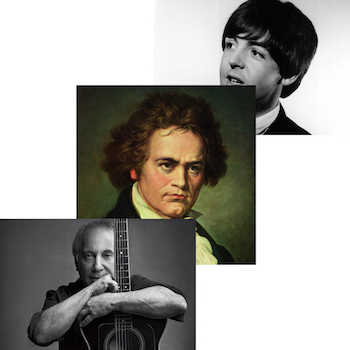Try writing a song first as an instrumental, and then look for its meaning.
What do you use your iPad for? Why not let it help you improve your songwriting skills? Download “The Essential Secrets of Songwriting” 10-eBook Bundle, and increase your song’s HIT potential. For desktop, laptop, iPad, iPhone, or any other mobile PDF-reading device.
 When you begin writing a song, either one of the following statements is usually true:
When you begin writing a song, either one of the following statements is usually true:
- You already have a good idea of what your new song is going to be about; (i.e., you’ve usually got at least a general topic, and perhaps a line or two of lyric), OR…
- you develop a hook and then soon after create a line of lyric that points to a general topic.
What I mean is: you don’t generally get far into the songwriting process without knowing what your song is about. Popular songwriting has usually always been that way.
I want to try to make a case for doing quite the opposite: writing a song as an instrumental first, and then try to find meaning in what you’ve written, to the extent that you then develop a topic and a lyric to partner with the music.
It’s not so strange; I did a post a couple of years ago in which I mentioned that Paul Simon does this very thing. He allows the musical gestures that he creates to imply a story or circumstance. While most songwriters write music and lyrics more or less together (moving back and forth between those elements in the same writing sessions), Simon often does it a bit differently: he creates a storyline/lyric to support what he’s already done in the music, based primarily on what the music is “saying” to him.
If you’ve never written instrumental music and then looked for meaning, this way of working may seem odd to you. But classical composers, many or most of whom wrote instrumental music as their main output, did that very thing.
Beethoven’s famous Symphony No. 5 is an instrumental work, but musicians have worked hard to find meaning in what he wrote. The famous writer and musician, E.T.A. Hoffmann (1776-1822) wrote an essay in 1813 called “Beethoven’s Instrumental Music,” and in that treatise he used the following words to describe Beethoven’s 5th:
- “…transport the listener…”
- “…apprehensive, restless longing…”
- “…oppressed and alarmed by intimations of things monstrous, destructive, and threatening wheezes for air with wrenching gasps…”
- “…the feeling of an unnamable longing…”
- “…allows the listener to achieve one single mood.”
Hoffman made those observations based purely on what he heard in the music. There were no lyrics, not even a descriptive title, to help.
In reality, we aren’t aware that Beethoven’s 5th is “about” anything at all, though Beethoven is said to have described the opening “da-da-da-DUM” motif as “fate knocks at the door!” He also described it to another individual on a separate occasion as an imitation of a yellowhammer, a European bird.
In reality, Beethoven likely did exactly what I am encouraging you do to: he created music, and then sought a more implicit meaning afterward. Paul McCartney is said to have done the same thing with his famous song “Yesterday.” The instrumental version of the song came first, and the lyrics and meaning came later.
So why not give it a try? If you’re about to start your next song, but you don’t know what it should be about, try writing the music first, and then find meaning afterward. It may seem strange to work that way, but see how far you can get toward completing the song before you commit to a meaning or story.
The benefit to doing this is that you’re more likely to assemble a song where the lyrics and instrumental treatment more suitably support the melody and chords that you’ve written. You may wind up with a song that has a very strong sense of musical cohesion, and an unusually strong ability to attract an audience.
______________
Written by Gary Ewer. Follow on Twitter.
 “The Essential Secrets of Songwriting” 10-eBook Bundle looks at songwriting from every angle, and has been used by thousands of songwriters. How to use chords, write melodies, and craft winning lyrics. (And you’ll receive a FREE copy of “Creative Chord Progressions“)
“The Essential Secrets of Songwriting” 10-eBook Bundle looks at songwriting from every angle, and has been used by thousands of songwriters. How to use chords, write melodies, and craft winning lyrics. (And you’ll receive a FREE copy of “Creative Chord Progressions“)











According to his book Billy Joel does it the same way as well.